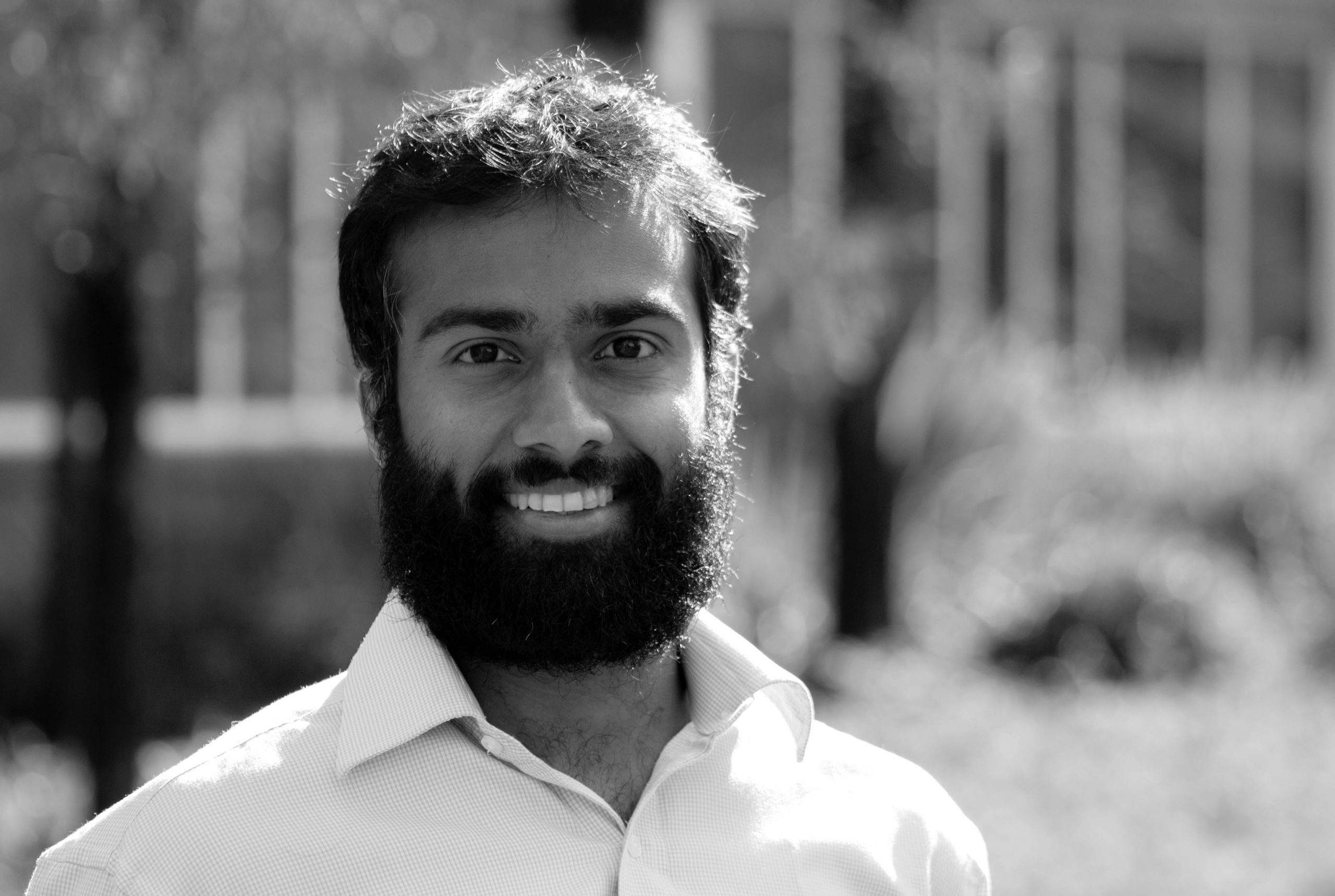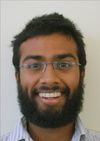
Nij Lal on his research into solar energy and his public engagement work after leaving Cambridge.
I think one of the biggest challenges of our generation is to understand the nature of climate change and develop ways to address it. If we don’t explain what we are doing we won’t bring the public along with us.
Nij Lal
“Public engagement is one of the most important things academics can do. We get so much funding for our research – if we don’t give back and explain what we are doing, our work loses its value,” said Niraj (Nij) Lal in 2010 when he was just one year into his PhD in Physics at the University of Cambridge.
It’s a commitment he has continued beyond Cambridge and something which has brought him multiple awards and national recognition in his home country, Australia.
He returned there after leaving Cambridge in the summer of 2012 and bicycling from one end of France to another, working on farms and vineyards and busking en route. He took up a three-year fellowship funded by the Australian Renewable Energy Agency at the Australian National University in Canberra which was stretched out because he went down to a nine-day fortnight and later to a four-day working week.
This has allowed him to continue his science communications work, which has seen him winning seed grants to take his science shows to schoolchildren across Australia as part of National Science Week. In 2013 and 2014 he performed shows for children at Questacon – the National Science and Technology Centre, where he remains involved as an academic content reviewer.
In 2013, Nij’s communications work saw him win a medal from his university and the ACT Young Tall Poppy of the Year Award from the Australian Institute of Policy and Science. He has continued to win more awards and to create new opportunities to engage with the public about scientific research.
In 2014 he was a national finalist in the British Council’s FameLab, which helps to develop the next generation of science communicators across the world. As a result he and his friend Hamish Clarke got the opportunity to create a radio show called the Hungry Science Beast for national radio where they explained the simple science of everyday stuff. In 2015 he was on the shortlist of ABC’s search for the top five scientists under 40 and currently he is a physics consultant for Screentime Australia for a physics show on the ABC channel. In 2015 Nij was awarded a contract to write primary school science shows for Newcastle Museum Express and received the nomination of the Australian Academy of Sciences’ to attend the Lindau Nobel Meeting which offers young scientists from all over the world the opportunity for an in-depth exchange with Nobel Laureates. This year he will be a state ambassador for National Science Week in August.
Nij has also branched out into writing, recently finishing his second children’s book. His first was an illustrated book about chaos theory and tells the story of a butterfly which learned of the butterfly effect of Chaos Theory, the phenomenon whereby a small change in a complex system can have large effects. The second is about an emu that learns how to fly by going into gravitational orbit, described as “Isaac Newton’s story of the apple falling on his head rewritten – great for all ages!’ by Sir Richard Friend, Cavendish Professor of Physics at Cambridge. Sir Richard called Nij a “gifted writer of children’s stories”. Nij feels the best way to get scientific ideas across to young children is “by stealth”, wrapped up in fun.
Solar cell research
In addition to his public engagement work Nij also manages to do important research, working to improve the efficiency of solar cells and building on the work he did at Cambridge. There he focused on nanovoid plasmonic enhanced low-cost photovoltaics – in layman’s terms, making solar cells more efficient – and cheaper – using really small structures. At the ANU, Nij was elected as a university early career academic fellow for research and he has since been offered a research fellowship at Monash University and CSIRO in Melbourne, which he commenced in March 2016.
Nij recently wrote a paper on tandem solar cells, which he calls “double decker solar cells which have t the potential for double the efficiency". Tandem cells are a stack of different solar cells on top of each other so they can capture more energy from the sun.
He is currently writing a paper on how nanostructures inspired from Morpho butterfly wings can help distribute the different colours of sunlight into optimal layers of these cells for even higher efficiency.
In addition to his research on solar cells, Nij is politically active on issues of environmental sustainability, transparent governance and surveillance. He is a current member of the Australian Greens, but was a former founding National Council Member of the Australian Wikileaks Party. Nij went to university with Assange, with whom he remains friends, but moved over to the Greens after the 2013 election. He still writes occasionally about surveillance issues and is the founder of noisevssignal.org – a movement for digital resistance against mass surveillance.
Nij says Cambridge and Gates Cambridge had a big influence on him. “The level of ‘possibility’ was amazing among Gates Cambridge Scholars. There was no barrier to what people could attempt. There were incredible things they were doing both academically and outside of books,” he says. He took full advantage. In addition to public engagement work – he graduated from the University’s Rising Stars public engagement programme for early career scientists, worked with the Naked Scientists programme and did outreach work with children and adults in the UK. He also played in the Cambridge Community samba band Arco Iris and is continuing his love of drumming in Australia. In 2013 founded the Raio de Sol Canberra Community Samba Band, which is now thriving and playing gigs across South Eastern Australia, including d at the 2014-15 Sydney Mardi Gras parades.
In keeping with the Gates Cambridge mission of making a difference, Nij volunteers for Engineers Without Borders and has just come back from Cambodia where he worked on a research project designing solar energy systems for households in a rural village. He is also a volunteer with the ACT Rural Fire Service in the Rivers Brigade, continuing on from work which saw him awarded a 2012 UK Gold Award for Volunteering.
Undergraduate years
Nij’s road to Cambridge was not linear. Born in Hawaii, he grew up in Canberra where he became interested in renewable energy research after taking time out of a degree in politics, philosophy, maths and physics at the Australian National University. He returned with a renewed desire to focus on maths and physics. He graduated in 2007 and chose Cambridge for his PhD because of its excellence in nanophotonics and photovoltaics. It was an area that interested him greatly, given that he comes from a family with a strong interest in environmental issues. Both his mother and older sister work on environmental policy issues.
The year before he started at Cambridge, Nij [2008] travelled to Western Australia where he worked for Scitech, the West Australian Government’s Science Outreach programme, taking shows about slime, bubbles and fun science out on the road to hundreds of schoolchildren, including those in remote aboriginal communities. “It was an incredible opportunity to see parts of Australia that you normally need permission to enter,” he says.
He remains dedicated to both researching renewable energy and communicating the possibilities of critical and creative thinking. He is passionate about explaining science to the public, particularly in terms of the challenges of climate change and sustainability. He says: “I think one of the biggest challenges of our generation is to understand the nature of climate change and develop ways to address it. If we don’t explain what we are doing we won’t bring the public along with us.”

Niraj Lal
- Alumni
- Australia
- 2008 PhD Physics
- Clare Hall
I commenced a PhD in Physics at the Nanophotonics Centre at Cambridge with Professor Jeremy Baumberg in January 2009, and I'm loving it. My topic is "Nanovoid Plasmon-Enhanced Photovoltaics" - using some new physics to make solar cells more efficient. I think one of the biggest challenges of our generation is to understand our planet's resources and develop ways to live with them sustainably. I'm enjoying researching a means of electricity generation that can be safe, clean and decentralised.












